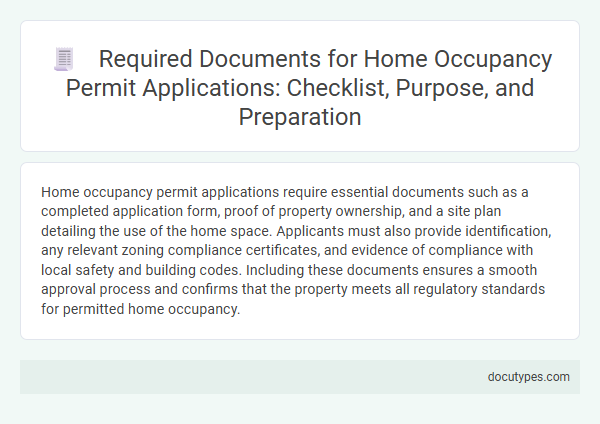Home occupancy permit applications require essential documents such as a completed application form, proof of property ownership, and a site plan detailing the use of the home space. Applicants must also provide identification, any relevant zoning compliance certificates, and evidence of compliance with local safety and building codes. Including these documents ensures a smooth approval process and confirms that the property meets all regulatory standards for permitted home occupancy.
Introduction to Home Occupancy Permits
A home occupancy permit allows residents to conduct business activities within their residential property legally. Obtaining this permit ensures compliance with local zoning laws and safety regulations.
- Proof of Residency - Documents such as utility bills or lease agreements verify that the applicant resides at the property.
- Business Plan - A detailed plan outlining the nature and scope of the home-based business is required to assess zoning compliance.
- Zoning Clearance - Official confirmation from the local zoning authority confirming that the intended use is permitted in the residential area.
Purpose of a Home Occupancy Permit
| Purpose of a Home Occupancy Permit | The Home Occupancy Permit authorizes the use of a residential property for business purposes while ensuring compliance with local zoning regulations. It helps maintain neighborhood integrity, limits disturbances, and confirms that the business operation is suitable within a residential area. |
|---|---|
| Required Documents for Application |
|
Overview of Required Documents
Applying for a home occupancy permit requires submitting several key documents to meet local regulations. These documents verify property details, zoning compliance, and safety standards.
Required documents typically include a completed application form, proof of property ownership, and a site or floor plan showing the intended use of the home space. You may also need to provide building permits or previous occupancy permits if applicable. Additional documentation such as fire safety certificates or environmental assessments might be necessary depending on the jurisdiction.
Identification and Ownership Proofs
For a home occupancy permit application, proper identification documents are essential to verify your identity. Commonly accepted forms include a government-issued photo ID, such as a driver's license or passport.
Proof of property ownership is equally important in the application process. Documents like the deed, property tax statement, or mortgage statement serve as valid evidence of ownership for the home occupancy permit.
Zoning and Land Use Compliance Documents
Home occupancy permit applications require specific documentation to ensure zoning and land use compliance. Proper submission of these documents is critical to meet local government regulations.
- Zoning Clearance - Confirms the proposed home business complies with local zoning ordinances and land use designations.
- Site Plan - Illustrates the property layout including structures, parking, and any proposed modifications related to the home occupancy.
- Proof of Land Use Compliance - Verifies that the property use aligns with community land use plans and restrictions.
These documents collectively ensure that the home-based business operates within legal land use frameworks.
Building and Safety Certificates
For a home occupancy permit application, Building and Safety Certificates are essential documents that verify the property's compliance with local regulations and structural standards. These certificates confirm the safety, habitability, and adherence to building codes required by municipal authorities. You must submit valid and up-to-date Building and Safety Certificates to ensure your application is processed efficiently and approved without delays.
Floor Plans and Site Maps
Obtaining a home occupancy permit requires submitting detailed documents that verify the structure's compliance with local regulations. Floor plans and site maps play a crucial role in demonstrating the property's suitability for residential use.
- Floor Plans Detail - Floor plans must clearly illustrate the layout, including room dimensions, walls, doors, and windows to ensure the space meets safety and zoning codes.
- Site Maps Illustrate Property Boundaries - Site maps show the exact location of the home on the plot, including setbacks from property lines and neighboring structures.
- Accuracy and Scale - Both floor plans and site maps must be drawn to scale and accurately reflect current conditions to facilitate thorough permit evaluation by authorities.
Utility and Infrastructure Documentation
Utility and infrastructure documentation is essential for home occupancy permit applications. This includes proof of water supply connections, sewage system compliance, and electrical service approvals. Your submission must also contain evidence of proper gas and drainage installations to meet local regulatory standards.
Step-by-Step Preparation Checklist
Which documents are essential for a Home Occupancy Permit application? Gathering accurate paperwork ensures a smooth approval process. A step-by-step preparation checklist includes:
Proof of property ownership or lease agreement confirming legal residency. Detailed floor plans or blueprints that outline the home's layout and usage areas.
Completed application form provided by the local permitting authority. Recent property tax receipts or utility bills validating the address.
Safety certificates such as fire alarm inspections and structural integrity reports. Identification documents like a government-issued ID or driver's license.
Environmental or zoning compliance documents demonstrating adherence to local regulations. Any previously granted permits or approvals relevant to occupancy.
Following this checklist helps you submit a thorough and organized Home Occupancy Permit application. Proper documentation avoids delays and facilitates efficient processing.
Which Documents Are Required for Home Occupancy Permit Applications? Infographic

